Regular SGM readers will remember indie filmmaker David Campion when we covered his debut feature PATROL MEN (which he co-directed with close friend Ben Simpson), well he�s back with his latest low budget opus WOODFALLS so we got our indie movie guru Stuart Willis on the case to check it out and catch up with writer/director David Campion to discuss his first solo work�
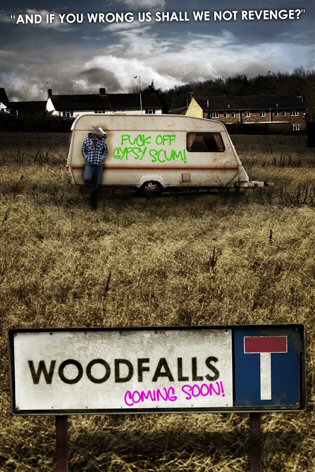
Stu: Hi David, thanks for agreeing to this interview. It's good to see you back on the scene with "Woodfalls". What's been happening between "Patrol Men" and this?
David: The transitional period between finishing a film and starting a new one is pretty brutal. There was almost two years between finishing production on Patrol Men and seeing it get distributed. In that time I got some �industry� jobs, moved to London, ran out of money and moved back from London with my tail between my legs.
I guess none of us really expected to see Patrol Men get distribution and when it did, it felt like a pat on the back and gave me reason to carry on. I wrote a lot, finished a feature which was impossible to shoot and then started work on something smaller. That started as a youth film called �Sweetblade�, which eventually grew into Woodfalls.
Stu: You've written and directed this film by yourself. How come your "Patrol Men" collaborator, Ben Simpson, wasn't involved on those levels?
David: Ben and I started the project together and he still has a story credit, but Woodfalls marked a change in how we approached material. It�s funny; you get close enough to someone that you start assuming that you�re always on the same wavelength. I never second guessed Ben because I thought I knew him too well, but that wasn�t the case and we went our separate ways.
Ben spent the last 10 months seeing the world. I spent the last 10 months cooped up in an editing room. I�m not sure who�s winning...
Stu: Was "Woodfalls" a conscious step away from the horror genre? I appreciate that it's easy to get pigeon-holed as a certain type of director: is this you taking early action to prevent that from happening?
David: I don�t think it was a conscious decision to move away from horror. In fact, Woodfalls started out as more of an exploitation film. The third act was way more extreme and there were some pretty vile scenes scattered throughout. At the time, shock value was still an important ingredient of my writing process.
After a few drafts, I started meeting actors and discussing the script. I met with one talented actor [he didn�t end up working on the film] and he suggested that the extreme stuff feels really �tacked on�. He was wise enough to tickle my ego and compared the script to This is England, but the third act let it down.
After that meeting, I realised that I didn�t want this to be a horror film. It was a drama and I should embrace that.
Stu: The fascination with travellers is very much in vogue of late. What was it that brought them to your attention, and inspired you to write about them?
David: I guess it�s hard to avoid travellers at the moment. But here�s the thing....I have travellers in my family. I have visited sites, interacted with traveller kids and attended a few weddings and funerals. Yep, I�ve been to a �Big Fat Gypsy Wedding�. When I was about 10 years old, I was play fighting with three traveller kids. Something changed and the stakes escalated; I ended up tied to a post with this kid pointing a pen knife at me.
Traveller culture is easy to mock and I think their representation within film and media is becoming increasingly lazy. I saw a film, �Travellers�, where they were using travellers like Rednecks were used in Deliverance. This seems like such an obvious route that I thought I would try writing something three dimensional.
Stu: You filmed "Woodfalls" in Surrey and Hampshire. Did you experience any ironic hostility from the locals?
David: We filmed Woodfalls all over the place. Most of the caravan stuff was shot around Hampton Court, quite a few interiors around London and then lots of the exteriors in Hampshire: the same sort of areas we shot Patrol Men in. Generally, people in small towns don�t trust cameras.
To be fair, I hate people with cameras too. I know they�re always going to be a pain in the ass, because the only thing they�re interested is getting their footage and they don�t care who they piss off to do so. I�m guilty of it too. It�s passion, pure and simple. But, I understand how annoying we can be.
That said, 99% of people were hospitable and understanding.
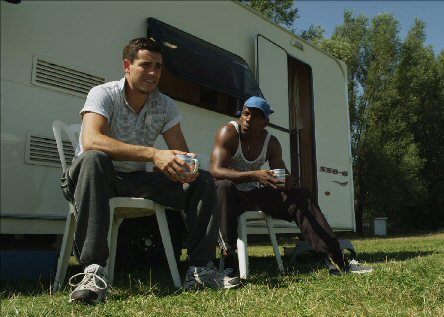
Stu: The theme of prejudice is an obvious one in "Woodfalls". What other themes are being explored?
David: I guess loyalty, especially towards families. The two male leads, Billy and Damon [played by Matthew Ferdenzi and Gareth Bennett-Ryan] have these arcs that are totally dominated by their relationships with their family. Because Billy�s father is no longer alive, he is expected to be a �man� and look after his mother and sister. Damon on the other hand, has a very complex, almost childlike relationship with his dad. He tries to be something his dad admires and that�s his big flaw- his dad�s an absolute cunt. HAHA.
My other big theme is early manhood. I�m 26. I don�t feel like a man, but I can�t play the teenager card anymore either. I�m in limbo and so are all of my characters.
I always joke, �Woodfalls is a coming of age film for people who should have already come of age.�
Stu: Could you tell us a little about the cast? There are some impressive turns, especially Gareth Bennett-Ryan who I thought really shone in the role of Damon.
David: Gareth was incredible. He would probably hate me for saying this, but he is definitely a little �method�. Not that he went around swearing and punching crew members, but when a scene called for him to fire up, he would really put himself in that place. The big confrontation towards the end between Billy [Matthew Ferdenzi] and Damon was incredible to watch- like the feeling of adrenaline you get from watching a real fight. I think we justifiably got some complaints from neighbours that day.
I auditioned in this decrepit warehouse on Camberwell Road. I saw a lot of great people in there. I really love auditions and get really excited to hear those words come to life. I also always write another draft of the script pretty soon after the audition process and that draft is always a vast improvement. Once you�ve heard actors struggle to articulate your robotically written dialogue, you realise it�s time to mix it up and inject some humanity in there.
From the Camberwell Road auditions, we found most of our key cast. Michelle Crane, who plays Rebecca, was fantastic. She had a lot of input and ideas- I�m pretty sure she did more research on gypsies than I did. I�m very fond of her exchange with Wozzle [Joe Law]. She�s confused, traumatised, and angry: a proper fucking mess. I remember shooting that scene. We were running over schedule, the special effects weren�t working as well as hoped and Michelle had to rush off to her day job [the glamour of low budget filmmaking]. The pressure of the moment and the intensity of the scene collided and Michelle broke down, but in character. To this day, I don�t know how much was Rebecca and how much was Michelle breaking down, but it was pretty special.
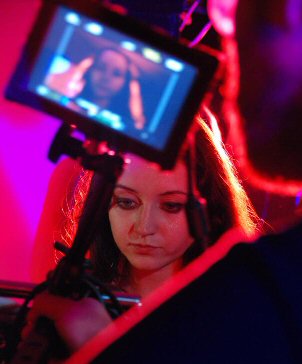
Stu: "Woodfalls" has a strikingly razor sharp look. What was it shot on?
David: We upgraded from the Canon XL2 [Patrol Men] to RED. In recent years, Louis [Patrol men/Woodfalls DOP] has become quite comfortable with the RED One. For me, it was awesome having some different lenses to play with.
Louis was camera man, AC, focus puller and DOP. He�s not the most relaxed person at the best of times, but with these added pressures, I�m surprised he didn�t explode. Louis and I have formed quite a strong working relationship over the years since Patrol Men. We both love coloured lighting and wanted to incorporate into as many areas of the film as possible. I guess the garish lighting comes from my love of horror, especially Argento�s work. There are close ups of Michelle in the club that look like she�s in hell. I love that shit.
Stu: A lot of the set-pieces feel authentic in terms of their characters and the language used. Is any of the film�s action autobiographical/anecdotal?
David: Almost everything is inspired by real events. As a town, Woodfalls is a fictional version of where I live. There�s this weird urban/rural vibe. Inner town is grim and warn-looking. People race their cars around, there�s a healthy circulation of drugs, fights, crime, but surrounding this town are fields. Miles and miles of glorious fields. From the outside, the area could be considered idyllic.
An ongoing joke, which secretly wasn�t a joke, was: If Boyz�N�the�Hood was set in rural England, it would look like Woodfalls. HAHA.
Stu: There�s an ambiguous ending which made me challenge whose side I was on. I enjoyed this tactic, but wondered if you were actually pulling the rug from beneath viewers� feet? Without wishing to lure you into spoiler territory, what�s your interpretation of the moral outcome here?
David: HA. My editor [Ian Fielding] is constantly questioning the morality of the finale. I have a solid grasp of it, but admit that it�s ambiguous. Here�s the thing...I generally hate twist endings. I rarely second guess films and hardly ever guess what�s going to happen in the end, but if I�m going along for the ride and feel cheated at the end, it leaves such a bitter taste in my mouth.
The end of Woodfalls may be a surprise and even to an extent, a twist, but I feel it comes purely from the characters. We spend a lot of time with the three leads [Rebecca, Billy, Damon] and I hope we understand their motives, however extreme they may seem.
At the end of the day, you may not agree with how a protagonist deals with a certain situation. But that�s life. I�m constantly making decisions that make me think, �If this was a film, would I be the hero or villain right now?� I love those grey areas.
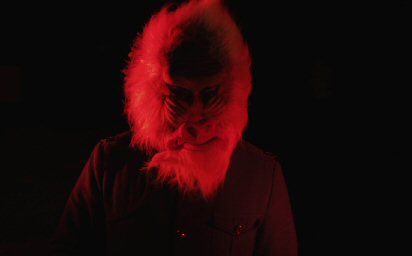
Stu: I appreciate the version I watched was a "rough cut", but am keen to know what (if any) changes you plan to make before the film seeks a commercial release?
David: There�s always technical stuff to improve. We could definitely use another sound mix and a colour grade. Grading is a fucking nightmare. You get it looking good on one screen and then watch it on another and it looks washed out.
Stu: One observation I made was that the film is short (72 minutes) and as such the main characters don�t really get explored outside of their immediate situations. How does Billy make ends meet, for example, and what makes Damon tick. In particular, I was left a little confused by the purpose of Bradley�s character. Are these things that have been covered in additional footage you�d shot?
David: HA. Niall [Maher, Patrol Men producer] asked how Billy made his money after he read the script.
72 minutes is short, but that honestly felt like the right length. I mean, if we had managed to make a 2.5 hour epic on the budget we had, then something would be wrong. Look at films like Primer and Freaks, both incredibly short, but fully formed. However, if went back, I would write more exposition and more �getting to know character� type scenes. I tried to keep it lean.....maybe I guess you need a little fat for flavour.
I should stop comparing Woodfalls to steak.
In traditional story terms, Bradley�s archetype is the �gatekeeper�. He opens Billy�s eyes to the delights of small town life. He introduces Billy to parties, drugs and girls. I guess Bradley�s arc isn�t clearly defined. In my eyes; he�s just the best wingman ever.
Stu: The soundtrack is an interesting, energetic one � it works extremely well. Could you discuss this a little? How it came about, and if/how your direction extends to the musical elements of the film?
David: I wanted to soundtrack to reflect what the guys would be listening to in their cars. Originally, I just wanted tracks. I got in touch with musician friends who generously donated lots of cool music. Hip hop, dubstep, drum�n�bass- the music is definitely in synch with the environment.
Once we had a solid cut, with tracks in place, I realised some scenes would benefit from a score. The Daytripper, AKA Gav Roberts [Lyrical Monsoon] expressed some interest in scoring and I took him up on the offer. He had no previous experience, but Lyrical Monsoon had already donated a few tracks anyway and he was familiar with what I was trying to achieve. I left him to it for a few weeks and he came up with amazing stuff. Like, amazing. I love the music when the guys are throwing the eggs at the caravan. So extreme and filthy.
I definitely think the score has a genre element. Gav would do a sick job with a horror film.
Those musical set pieces were planned, to an extent, but this is where Ian�s [Fielding, editor] work really shines. He�s such an aggressive editor. I knew this going into it, so I would try to give him as many options as possible. Ian has such a grasp over image and rhythm that I�ll never have. He had a lot of control over those sequences and this benefited the final film considerably.
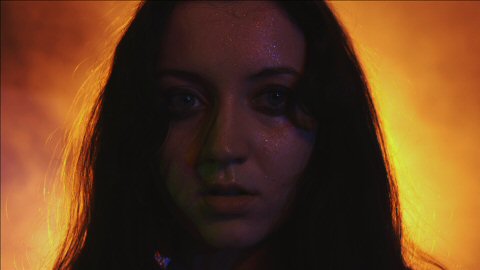
Stu: I was taken aback by how angry "Woodfalls" is too: from its dialogue, to its bone-crunching fight scenes, to its frequent arguments - it�s one furious film! Is this your personal anger being vented?
David: I was 21 when we shot Patrol Men. It felt almost heroic. A group of young mates, running around with a camera and having the time of their lives: Perfect.
Fast forward 4 years. I�m broke, living at home with my parents, struggling to find work [a certain supermarket chain that rhymes with �Fresco� has now rejected me 3 times] and not working with Ben, or Niall for that matter. I was lonely and bitter and that manifested itself perfectly into the script.
I dread to think what I would write about if I was actually in a good mood. Rubbish.
Stu: I�ve cited Shane Meadows as a comparison point in my review. Would you agree that films such as "Dead Man�s Shoes" and "This is England" were an influence?
David: Wholeheartedly. Whenever I write or shoot, I always have Meadows in the back of my mind. He has this no bullshit style and always manages to make things feel contemporary and relevant, even when he�s making a coming of age drama set in the eighties.
The year before we shot Woodfalls was a great one for British film. Kill List, Submarine, Tyrannosaur; it was really inspiring to see so many home grown gems. Ben Wheatley is fast becoming a favourite of mine. I literally just watched A Field in England. Fuck, it was good.
Stu: What happens now? How do you go from making the film to getting it seen, marketed etc?
David: This is the scary part. Natasha Bedingfield had it right when she said, the �future is unwritten�.
We�re just starting to show the film to people and we�ve submitted to a few festivals. Distribution has changed, even since Patrol Men was released. Crabtree, who released Patrol Men have gone under. When I heard that, I automatically blamed Patrol Men, but supposedly it had more to do with some film starring Jesse Eisenberg. HA.
Stu: And � what�s next?
David: Well, like Natasha Bedingfield once said...
I�m joking. I�m writing. I�m pitching it as John Hughes meets Lord of the Flies. It doesn�t have a title yet. I guess I feel like I should write about my youth whilst I still remember it.
I�m also working on a story about a backyard wrestler. You know, I used to want to be a wrestler? My name was �RipSaw� and I was a fearless hardcore extraordinaire. My finishing manoeuvre was called the Laceration. They were good days.
Stu: Thanks again for your time David, and good luck with the film.
David: Thank you Stuart, all the best.
Special thanks to David Campion. Follow the progress of WOODFALLS at the films official Facebook page.